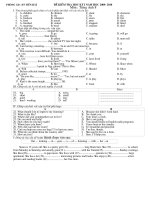- Trang chủ >>
- Đề thi >>
- Đề thi tuyển dụng
ĐỀ THI TRẮC NGHIỆM TIẾNG ANH
Bạn đang xem bản rút gọn của tài liệu. Xem và tải ngay bản đầy đủ của tài liệu tại đây (38.61 KB, 4 trang )
1
ĐỀ 1
1. Doctors _____ an answer to AIDS yet.
A. have found B. found
C. haven't found
D. hasn't found
C. washed
D. to wash.
2. Do you mind _____ up?
A. wash
B. washing
3. He _____ to give up smoking since last week.
A. was trying
B. have tried
C. has tried
D. tried.
C. to walk
D. walking.
4. He enjoys _____ in the rain.
A. walk
B. walks
5. Would you like _____ to my party?
A. come
B. to come
C. coming
D. came.
6. I do not mind _______ you my opinion.
A. tell
7
B. to tell
C. telling
D. told
He was the first forward _______ a goal in yesterday's match.
A. score
B. to score
C. scoring
D. scored
8. We come to congratulate you_______ your success.
A. on
B. at
C. with
D. about
9. Although she had prepared carefully ______ the oral test, she did not succeed ______answering all the questions.
A. for/in
B. on/with
C. cat/with
D. to/at
10. Walking and golf increased in _________ during the 1980s.
2
A. popular
B. popularity
C. popularize
D. popularly
11."Don’t shout", I said to Jim.
A. I told Jim don't shout
B. I told to Jim not to shout
C. I told Jim not to shout
D. I said to Jim don't shout.
12. "Please don’t tell anyone what happened", Ann said to me
A. Ann asked me don't tell anyone what happened.
B. Ann told me don't tell anyone what happened.
C. Ann said to me don't tell anyone what happened.
D. Ann asked me not to tell anyone what happened
13.This village doesn’t have any good schools.
A. The schools in this village are very good.
B. There are no good schools in this village.
C. The schools in this village are not as good as I thought.
D. The schools in this village are not so bad.
14. This coffee / too hot / me / drink.
A. This coffee is too hot to me to drinking.
B. This coffee is too hot for me drinking.
C. This coffee is too hot for me to drink.
D. This coffee is too hot for me that I can’t drink it.
3
15. If/I / be you / I / not / buy / that / cellphone.
A. If I am you I won’t buy that cellphone.
B. If I were you I wouldn’t buy that cellphone.
C. If I had been you I wouldn’t have bought that cellphone.
D. If I can be you I won’t buy that cellphone.
II. Choose the word which has the underlined part pronounced
differently from the rest.
16. A. surf
B. communicate C. purpose
D. hamburger
17. A. groom
B. room
C. flood
D. bloom
18. A. hide
B. ivory
C. decline
D. continent
III. Choose the word which is stressed differently from the rest.
19. A. compulsory B. casual
C. comprise
D. impress
20. A. charity
B. benefit
C. pesticide
D. computer
IV. Choose (A, B, C or D) that incorrect.
21. William Harrison, the man who served the most short term, died of
pneumonia several weeks after his inauguration.
A.who
B. the most short C. of
D. after
22. Abraham Lincoln was one of four presidents who was assassinated.
A.one
B. presidents
C. who
D. was
23. James A. Garfield was shot during his first year in office by a man to that
he wouldn't give a job.
A. shot
B. during
C. that
D. wouldn't
24. He doesn't much like the work, but he enjoyed the relationships with the
other workers.
A. much
B. but
C. enjoyed
D. with
4
25. After getting her six-year-old daughter ready and driving her to the school,
she starts on the housework.
A. getting
B. six-year-old
C. driving
D. the school
V. Choose the suitable word to fill in each plank.
Language studies traditionally emphasized verbal and written communication.
(26) ________ about the 1960's, however, researchers have seriously begun to
consider what takes (27) ________ without words in conversations. In some
cases, nonverbal communication occurs more often than verbal one. For (28)
_______ if you ask an obviously depressed person, "What's wrong?" and he
answers "Nothing, I'm fine." you probably will not believe him. Or when an
angry person says "Let's forget this subject. I don't want to talk about. it
anymore!" she has not stopped communicating. Her silence and withdrawal
continue to (29) ________ emotional meaning.
One study done in the United States showed that 93 percent of a message was
transmitted by the speaker’s tone of voice and facial expressions. Only 7
percent of the person's attitude was conveyed by words. (30) ________, we express our emotions and attitudes more nonverbally than verbally.
26. A. As
B. For
C. In
D. Since
27. A. place
B. pace
C. upon
D. off
28. A. rate
B. example
C. cost
D. as
29. A. exchange
B. transfer
C. convey
D. contain
30. A. Successfully B. Unfortunately C. Apparently D. Traditionally









